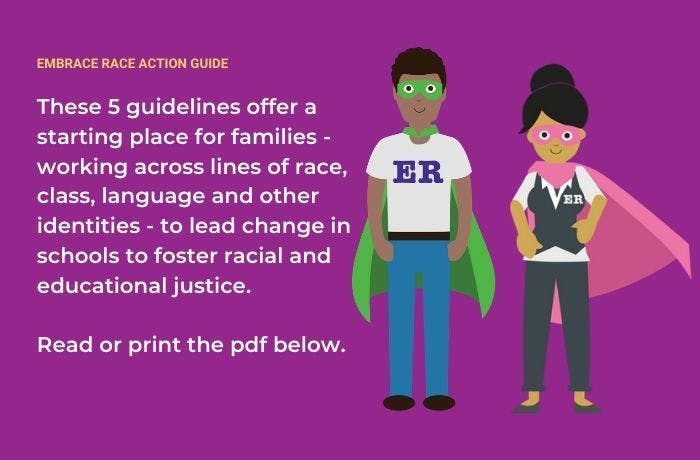Tips for collaborating with other families for educational justice
By Dr. Ann Ishimaru (Author of Just Schools)

In my work as an educational researcher and organizer, I have focused on improving educational leadership - both formal and family/community - to create equitable educational environments, with a particular focus on leveraging the expertise of students, families, and communities of color and those marginalized in schools.
These 5 guidelines
offer starting points for families working to lead change in schools to foster
racial and educational justice. Collaborating across lines of race, class,
language, and other identities is challenging, but collective efforts to build
solidarities and power can realize equity-focused change in schools. (Check out the related webinar with EmbraceRace here.)
1) Recognize that schools are racialized spaces.
Schools have been a source of colonization and oppression for many Indigenous, Black and immigrant communities. Recognize how school funding and resources; tracking and access to specialized programs; and teacher expectations and behavioral discipline are shaped by race and history. Class divides as well. Middle class parents of color share some experiences of racism and oppression in schools with working class families of color, but we need to build solidarities across lines of racial and economic marginalization.
2) Center families of color and those most impacted by injustices.
Start small and build relationships among families impacted by injustices. Recognize that the individualistic norms and expectations associated with white middle class parents are privileged in schools. Move beyond the PTA/PTO and consider meeting somewhere other than the school. Hold time and space for people to share their stories and lived experiences. Work to build a collective focused on addressing the racial injustices that matter to those impacted by them.
3) Explicitly model putting race on the table.
If you identify as a person of color, name how you identify as well as other dimensions of your identity (for instance, perhaps you have experienced racism but you also benefit from colorism or cis-gender privilege). Naming the complexity of our identities helps to disrupt the notion of a hierarchy of oppression in which one person’s issues or experiences are more valid than someone else’s. If you identify as white, own and say that. Consider naming how you hope to enact solidarity in that space (perhaps by not focusing the conversation on your issues, listening more than talking, or working hard not to express your fragility when people are sharing experiences or talking about racism).
4) Invite educators of color and other equity-focused leaders to partner as learners and allies.
Some parents have such faith in their schools that they inadvertently leave all the power in the hands of schools. But families also have critical knowledge about their children that schools need, especially when it comes to disrupting injustices. Educators of color and other equity-focused leaders can bring new insights and opportunities for change in partnership with families when they enter parent spaces as learners and allies (not experts with the “solution”).
5) Be prepared to intervene in power imbalances.
Power dynamics inevitably emerge in efforts to address injustice. Starting with explicit norms can help frame conversations. Even with norms, though, an individual or group (such as well-meaning white parents) may dominate the conversation or impose solutions. Especially if they dismiss the concerns of families of color, evade issues of race and power, or reinforce stereotypes, doing nothing can reinforce racial inequities. Consider ahead of time with others what to do, such as inviting others to contribute to the conversation, naming what you see happening, or encouraging the individual to address their concerns in another space. Work to transform power in the moment and over time in collective efforts to foster “just schools.”
Ann Ishimaru



